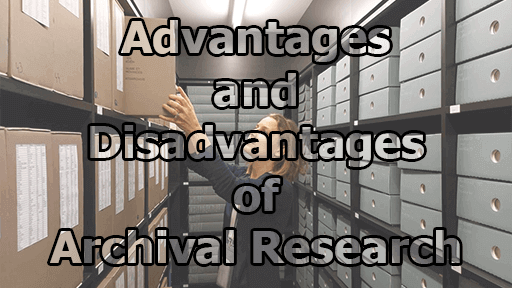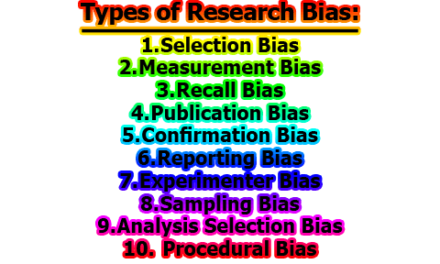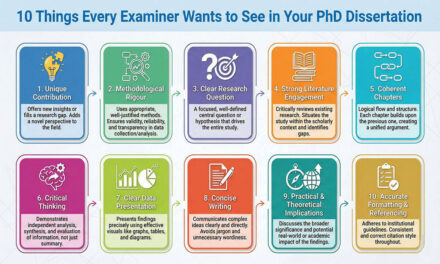Advantages and Disadvantages of Archival Research:
Archival research is a method of investigation that involves the analysis of existing data, documents, records, and other sources of information. This type of research is often used in various fields, including history, sociology, psychology, and more. Like any research method, archival research has its own set of advantages and disadvantages. Here, we will explore some of the necessary advantages and disadvantages of archival research.
Advantages of Archival Research:
1. Rich Historical Data: Archival research provides researchers with access to a wealth of historical data. Original documents, manuscripts, letters, newspapers, photographs, and other primary sources offer a detailed and nuanced understanding of past events and contexts. This richness allows scholars to explore historical narratives with a level of depth that might be challenging to achieve through other research methods.
Researchers can uncover first-hand accounts, eyewitness testimonies, and contemporary records that contribute to a more authentic reconstruction of historical events. This advantage is particularly crucial for historians and scholars aiming to develop a comprehensive and accurate portrayal of the past.
2. Longitudinal Analysis: One significant advantage of archival research is its ability to facilitate longitudinal analyses. Archives often contain materials spanning extended periods, enabling researchers to trace developments, changes, and trends over time. This longitudinal perspective is invaluable for understanding historical or social processes that unfold gradually, offering insights that might be missed in studies with shorter timeframes.
Longitudinal analyses also allow researchers to identify patterns, turning points, and the impact of various factors on the course of events. This comprehensive temporal view enhances the robustness of research findings and contributes to a more nuanced understanding of historical dynamics.
3. Cost-Effectiveness: Archival research is often more cost-effective compared to other research methods that involve data collection from scratch. Instead of investing resources in designing and conducting surveys, experiments, or fieldwork, researchers can leverage existing archival materials. This cost efficiency is particularly advantageous for projects with limited budgets or for scholars working in fields where extensive data collection can be prohibitively expensive.
By utilizing archival resources, researchers can focus their financial resources on travel to access archives, digitization efforts, or other activities that enhance the quality of their research without the need for extensive primary data collection.
4. Unobtrusive Nature: The non-intrusive nature of archival research is a notable advantage, especially when studying sensitive topics or historical events. Unlike experimental or survey-based research, archival research does not require direct interaction with subjects. This characteristic makes it particularly suitable for investigating historical periods or cultural contexts where direct participation might be challenging or impossible.
The unobtrusive nature of archival research also reduces the risk of researcher bias influencing participant responses, contributing to the reliability of findings. Researchers can objectively analyze historical documents without introducing external variables that could impact the research outcomes.
5. Multiple Data Sources: Archives offer a diverse range of data sources, including official documents, personal correspondences, newspapers, maps, photographs, and more. This variety enriches the research process by providing multiple perspectives on the same events or phenomena. Researchers can triangulate information from different sources, enhancing the reliability and validity of their findings.
Access to multiple data sources is particularly advantageous when studying complex historical events or phenomena with multifaceted dimensions. The combination of various materials allows for a more holistic and nuanced interpretation of the subject under investigation.
6. Authenticity and Reliability: Archival materials are considered authentic and reliable sources of information. Original documents, when properly preserved, offer a direct link to the past and are less susceptible to biases introduced by interpretations or recollections. The authenticity of archival data contributes to the credibility of research findings, providing a solid foundation for historical reconstructions.
Researchers can have confidence in the accuracy of archival materials, knowing that they are working with primary sources that were created contemporaneously with the events being studied. This aspect distinguishes archival research from studies relying on secondary or recollected information.
7. Contextual Understanding: Archival research provides a rich contextual understanding of historical events. Documents in archives are often situated within specific historical, cultural, social, or political contexts. Researchers can analyze not only the content of the materials but also the circumstances under which they were created.
Understanding the context is crucial for interpreting the significance of events and discerning the motivations of individuals or groups involved. Archival research allows researchers to go beyond the surface of historical narratives, uncovering the underlying factors that shaped the course of events.
8. Access to Unpublished Information: One of the advantages of archival research is the potential to discover unpublished or less-known information. Archives often house materials that have not been widely circulated or studied. Researchers can uncover hidden gems, such as personal diaries, letters, or official documents that have not been previously explored.
This access to unpublished information provides scholars with the opportunity to make original contributions to their field. By bringing to light previously overlooked materials, researchers can expand the existing knowledge base and offer fresh insights into historical or social phenomena.
9. Useful for Comparative Analysis: Archival research is well-suited for comparative studies, allowing researchers to analyze and compare different periods, regions, or groups. The availability of diverse archival materials enables scholars to explore variations and similarities in historical or social patterns.
Comparative analyses contribute to a deeper understanding of how various factors influence outcomes across different contexts. This advantage is particularly valuable for researchers seeking to identify general principles, cultural variations, or the impact of specific events on different populations.
10. Preservation of Cultural Heritage: Archival research plays a vital role in preserving cultural heritage. By maintaining and studying historical records, researchers contribute to the documentation and conservation of cultural identity. Archives serve as repositories of a society’s collective memory, safeguarding valuable information for future generations.
The preservation of cultural heritage through archival research ensures that the lessons of the past are not lost. Researchers, by studying and disseminating knowledge from archives, help foster an appreciation for cultural diversity and contribute to the ongoing dialogue about the importance of preserving historical artifacts and documents.
Disadvantages of Archival Research:
1. Selective Bias: One significant disadvantage of archival research is the presence of selective bias. Archives may not encompass a comprehensive record of events. The materials preserved are often subject to the biases and decisions of those responsible for their curation and maintenance. This selectivity can result in gaps and distortions in the available data, impacting the completeness and accuracy of the historical record.
Researchers must be aware of the potential biases in the selection and preservation of materials, considering how these biases may affect their interpretations and conclusions.
2. Limited Control Over Data Quality: Archival researchers have limited control over the quality of the data they encounter. The accuracy and completeness of historical records depend on the practices of individuals who created, maintained, or curated them. Errors, omissions, or intentional modifications may compromise the reliability of the archival data.
Researchers must critically evaluate the quality of the data, considering factors such as the source’s credibility, the conditions of preservation, and any potential alterations that might have occurred over time.
3. Subject to Deterioration: Archival materials, especially older ones, are susceptible to physical deterioration. Factors such as environmental conditions, pests, and handling can contribute to the degradation of documents. This deterioration can render some materials illegible or fragile, limiting their usability and potentially leading to the loss of valuable historical information.
Preservation efforts, including digitization and proper storage conditions, are crucial to mitigate the impact of deterioration on archival materials.
4. Ethical Concerns: Archival research may raise ethical concerns, particularly when dealing with sensitive or private information. Some documents may contain personal details, confidential data, or information that, if disclosed, could violate privacy rights or cause harm to individuals or groups. Researchers must navigate these ethical considerations carefully, adhering to principles of confidentiality and respecting the rights of those whose information is contained in archival materials.
In some cases, obtaining permissions or redacting sensitive information may be necessary to ensure ethical research practices.
5. Difficulty in Access: Accessing archival materials can be challenging, especially if researchers must travel to distant archives or if restrictions are in place due to security or preservation concerns. Physical distance, limited opening hours, or restrictions imposed by archive custodians may hinder researchers’ ability to access crucial documents.
The difficulty in access can pose a barrier, particularly for scholars with limited resources or those working on time-sensitive projects. Advances in digitization efforts can alleviate some of these challenges, but not all archives are readily available in digital form.
6. Interpretation Challenges: Understanding the context in which archival documents were created can be challenging. Lack of contextual information may lead to misinterpretations or incomplete understandings of the data. Researchers must contend with the ambiguity that can arise when interpreting historical documents, considering the cultural, social, and political context in which the materials were produced.
Addressing interpretation challenges requires a careful examination of the historical context, as well as a nuanced understanding of the language, symbols, and perspectives present in the archival materials.
7. Inability to Address Specific Research Questions: Archival materials may not always align with specific research questions. Researchers may encounter limitations in finding relevant data to address their hypotheses or inquiries. The mismatch between available archival materials and the specific focus of a research project can hinder the researcher’s ability to draw meaningful conclusions.
Careful planning and a flexible approach are necessary to adapt to the constraints imposed by the available archival data and still contribute meaningfully to the research field.
8. Inherent Selection Bias: Archival materials may suffer from survivorship bias, meaning that the records preserved in archives might represent only a fraction of the original documents. This bias can occur when certain materials are lost, destroyed, or never collected, leading to an incomplete and potentially skewed representation of historical events.
Researchers must be mindful of survivorship bias and its potential impact on the generalizability of their findings. Recognizing and acknowledging the limitations imposed by survivorship bias is essential for maintaining the integrity of the research.
9. Time-Consuming Nature: Archival research can be time-consuming. Navigating through extensive archives, deciphering historical documents, and conducting thorough analyses require a significant investment of time and effort. Researchers may find themselves spending extended periods in archives, searching for relevant materials and piecing together information from diverse sources.
The time-intensive nature of archival research can be a constraint, particularly for researchers working under tight deadlines or with limited resources. Efficient organization and prioritization are essential skills for managing the temporal demands of archival research.
10. Lack of Standardization: Archives often lack standardized formats, making it challenging to compare and synthesize information across different sources. Variability in the ways documents are organized, cataloged, and preserved can complicate the research process. Inconsistencies in terminology, classification, or indexing systems may hinder the researcher’s ability to conduct systematic analyses.
Researchers must navigate this lack of standardization by carefully documenting their methods and being transparent about the potential limitations arising from the heterogeneous nature of archival materials.
In conclusion, while archival research offers invaluable benefits in terms of access to historical data and authenticity, researchers must be mindful of its limitations. Understanding the strengths and weaknesses of archival research is essential for conducting meaningful and rigorous investigations in various academic disciplines.

Library Lecturer at Nurul Amin Degree College










